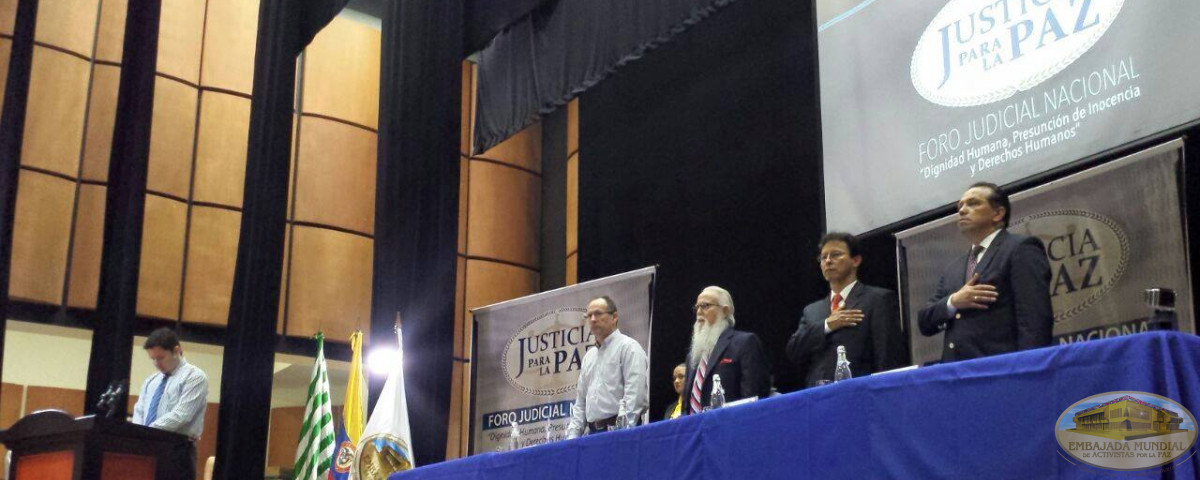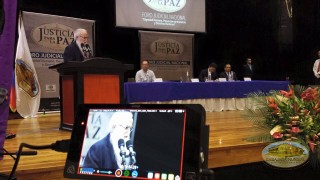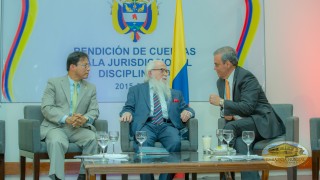II Judicial Forum in Colombia EDUCATION FOR PEACE IN THE POST-CONFLICT STAGE
It takes an education for peace in the reconciliation process. In this way, opportunities for discussion and reflection are opened in the Second National Judicial Forum "Human Dignity, Presumption of Innocence and Human Rights" in Colombia, organized by the Global Embassy of Activists for Peace (GEAP).
Colombia is currently in a peace and negotiation process between the government and the military group outside the law known as the Revolutionary Armed Forces of Colombia (FARC); main actors in the internal conflict that have plagued this country for more than five decades.
These negotiations, which are based in Havana, trying for the third time a reconciliation, to put an end to the fighting between left-wing guerrillas, right-wing paramilitaries, and the Colombian State. The fighting which has claimed the lives of more than two hundred thousand people.

In this context, the GEAP in partnership with the Departmental Assembly of Meta, in eastern Colombia, developed as part of its project "Justice for Peace" the Second National Judicial Forum "Human Dignity, Presumption of Innocence and Human Rights"; ceremony which was held in the Teatro la Vorágine and managed a wide participation of judges, legislators, lawyers, prosecutors, members of the Armed Forces, officials of National Penitentiary and Prison Institute of Colombia (INPEC), and more than two hundred students in their 7th semester of law and other specializations of the Cooperative University of Colombia.
Dr. Mauricio Niño Guayacan, President of the Departmental Assembly, opened the event by highlighting the need to cultivate the land for the post-conflict: "We are positive that the lectures that will come out of this event will help continue building the scenario for peace and that peace workshop that we hope will be the Department of Meta in the post conflict (...) Therefore we must endeavor to have a new generation that can and is prepared to live in peace."
Colombia as an example for the world
Dr. William Soto Santiago, Global Ambassador of the GEAP and promoter of these forums at the national and international level, in his speech, supported the negotiations currently taking place between the two groups:
"The peace talks that take place today position the Colombian nation as an example to other nations around the world. This peace process deserves our support and contribution in the search for solutions to overcome the differences.
And the peace that Colombia craves and needs, can only be built on the basis of truth, with prompt and effective justice, whose primary objective should be to compensate the victims and not only to punish the perpetrators, "he said.

Dr. Camilo Reyes Montoya, 7th Attorney before the Court of Cundinamarca and Bogota, further delving into this premise, emphasized the need to humanize justice through the protection and defense of human dignity as the source of any legal guideline. "The presumption of innocence born of human dignity," he said.
Dr. Alcibiades Vargas, Judge of the Criminal Chamber of the Superior Court of Villavicencio spoke on the theme: "Human dignity and the rule of law" and made an analysis of the feasibility of alternatives to house arrest. On this, Dr. Miguel Polania, a special prosecutor assigned in Villavicencio said that this principle of freedom will always be a subject matter of a supreme force, especially when violent scenarios such as those currently emerging in Colombia are present: "Peace must be placed before the recognition of fundamental rights, such as human dignity. It involves weighing in the balance the founding rights, what must be forfeited: freedom of the individual or the safety of the community."
"The pen is mightier than the sword" - Chair for Peace
The professor of the Cooperative University of Colombia, Mr. Hernando Alvarez Quijano, and student representative, Juan David del Campo, also spoke at the forum presenting the Academy as proactive in maintaining that post-conflict in peace.

The Professor, referring to the English literary topic which states that "The pen is mightier than the sword", highlighted that now is the moment we need universities to change their education and their syllabus to instill principles such as human dignity in the classrooms: "What will happen to those demobilized guerrillas? How are we going to integrate them into our society? Education is the best way to integrate them. And therefore, we have to change education in all universities to address this post-conflict stage. "
These initiatives support the Chair for Peace that the GEAP is preparing in different Latin American countries, which seeks to be integrated into education systems.
(See début of the project in Paraguay)


